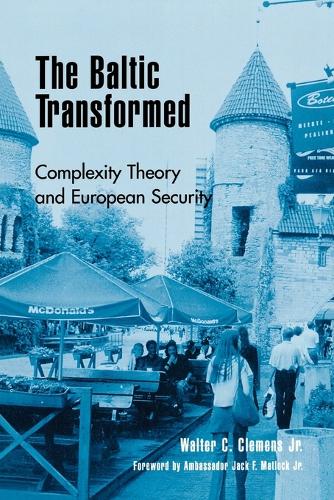
The Baltic Transformed: Complexity Theory and European Security
(Paperback)
Publishing Details
The Baltic Transformed: Complexity Theory and European Security
By (Author) Walter C. Clemens
Bloomsbury Publishing PLC
Rowman & Littlefield Publishers
25th May 2001
United States
Classifications
Tertiary Education
Non Fiction
Political economy
320.9479
Physical Properties
Paperback
320
Width 146mm, Height 230mm, Spine 18mm
417g
Description
Why isn't the Baltic region like the Balkans Why have the Baltic republics not experienced ethnic cleansing, border wars, authoritarian rule, and social chaos Instead, peace, democracy, and market economies have taken root since the fall of communism. Walter C. Clemens, Jr., here uses complexity theory, which analyzes the role of self-organization in complex adaptive systems, to explain the Baltic miracle. He argues that the theory is a vital tool for understanding the remarkable strides made by Estonia, Latvia, and Lithuania since 1991 in coping with the transition to partnership with the new Europe. One of the first books to apply complexity theory to a major sphere of world politics, The Baltic Transformed will provoke constructive debate with its ambitious and well-grounded analysis of not only Baltic developments but European security more generally. Visit our website for sample chapters!
Reviews
Beyond presenting a new way to look at the world, Clemens has provided readers with an excellent resource to study a region of the world that should receive more analysis then it does. * East European Politics and Societies *
An authoritative account of the successful Baltic transitionstudded with pithy observation and historically rooted insight.Clemens' sweeping command of the region allows for a nuanced treatment of all three small but complex countries. -- Martha Merritt, University of Notre Dame * The Russian Review *
Provides interesting analyses of how the Baltic societies mastered the challenges of foreign domination. . . . Rich with data, reflections, and perspectives. -- Anton Steen * Slavic Review *
The Baltic Transformed...gives the best available introduction to Estonia, Latvia and Lithuania today, while at the same time presenting cogent arguments for the importance of studying these three countries in the 21st century. The book also provides a valuable history of the Baltic in the 1990s. -- Guntis midchens * America: The Jesuit Review of Faith & Culture *
Clemens provides a detailed societal-wide overview of the transition of the Baltic States since 1991. Rather than limiting himself to political and economic developments, Clemens also focuses on broader issues of health, education, social institutions, minority and citizenship questions, the environment, crime, and differences in generational perceptions. Particularly interesting is his analysis of how the Balts worked within the Soviet system in order to exit it. * Millennium *
Author Bio
Walter C. Clemens, Jr., is professor of political science at Boston University and an associate at Harvard's Center for Science and International Affairs and the Davis Center for Russian Studies.
